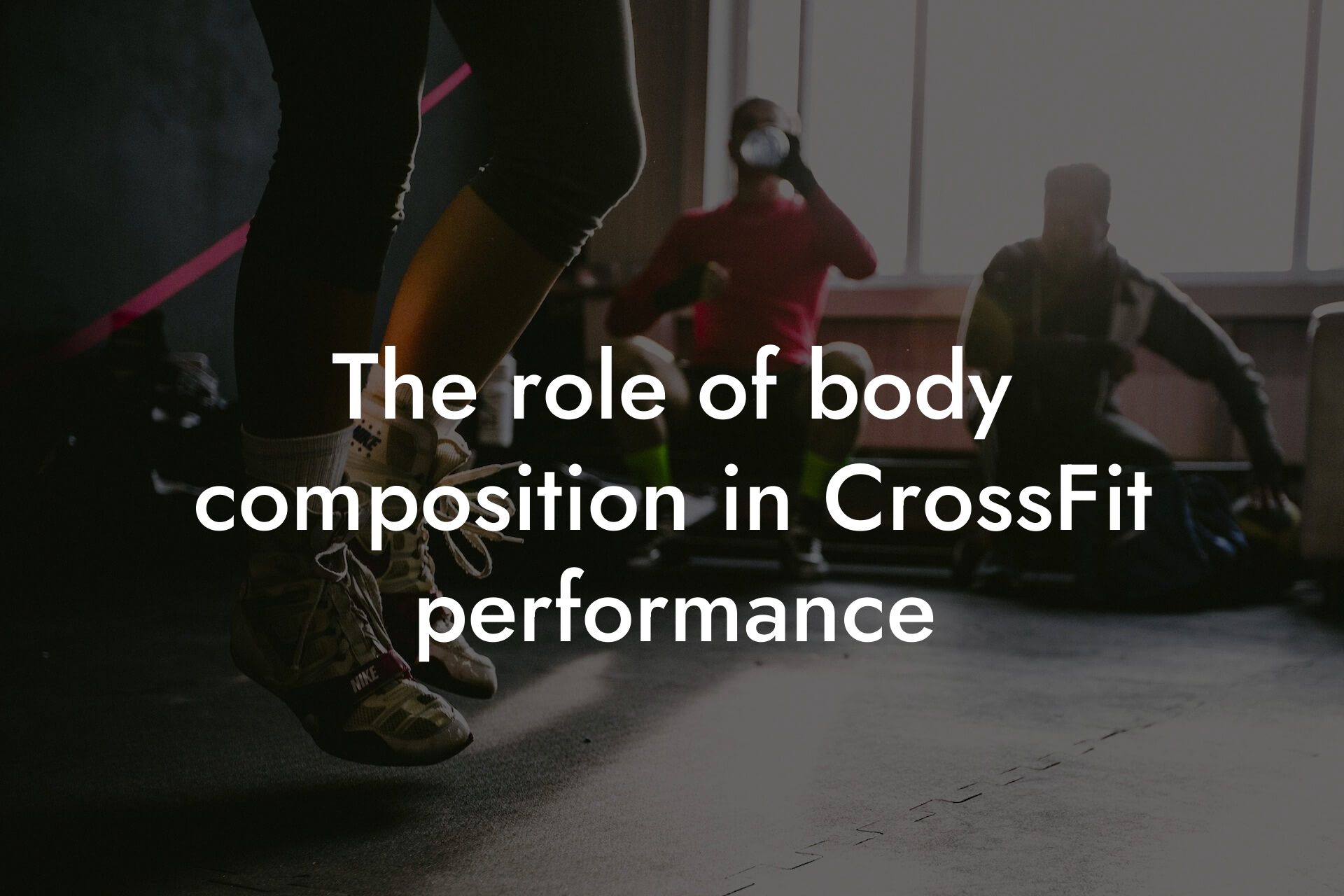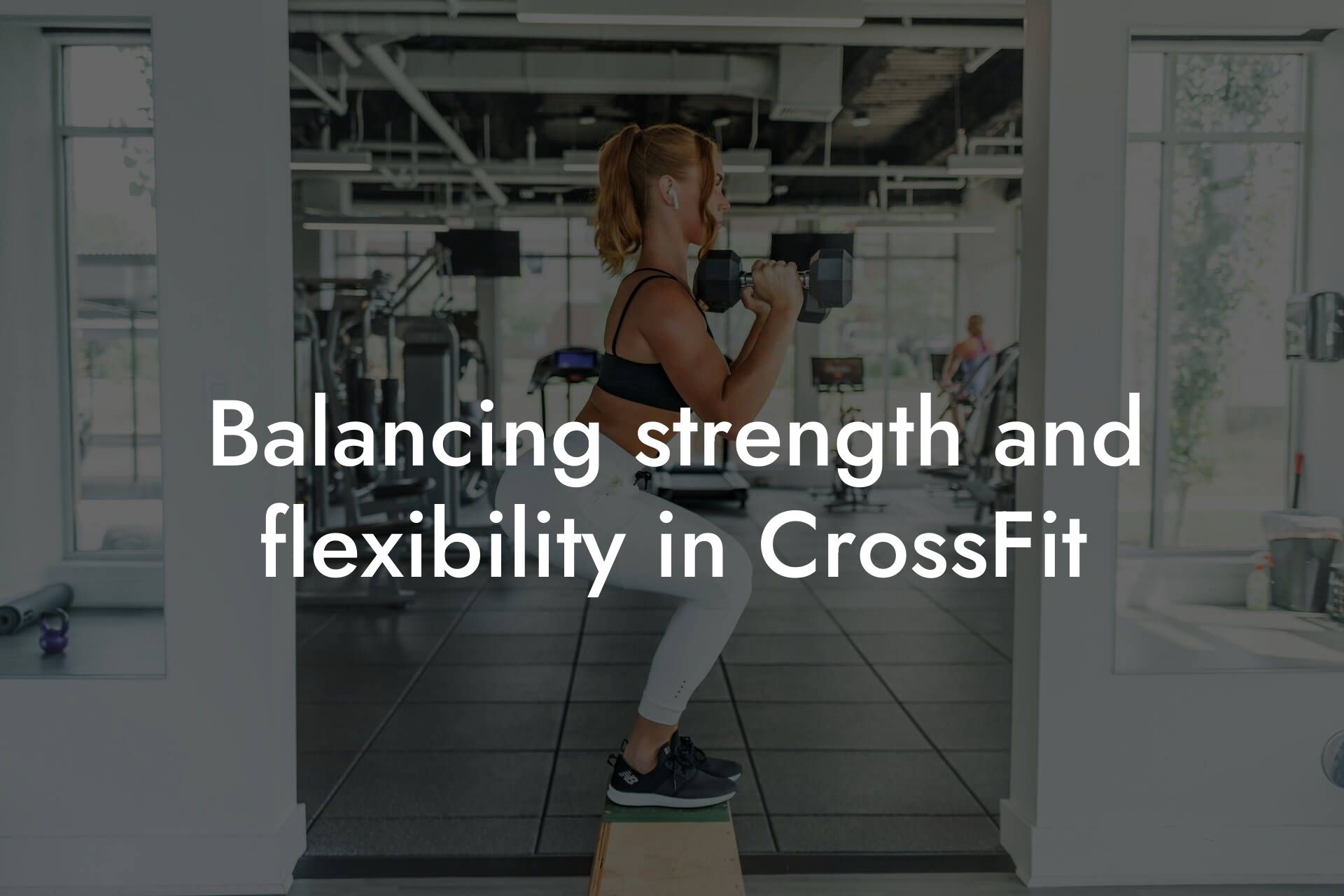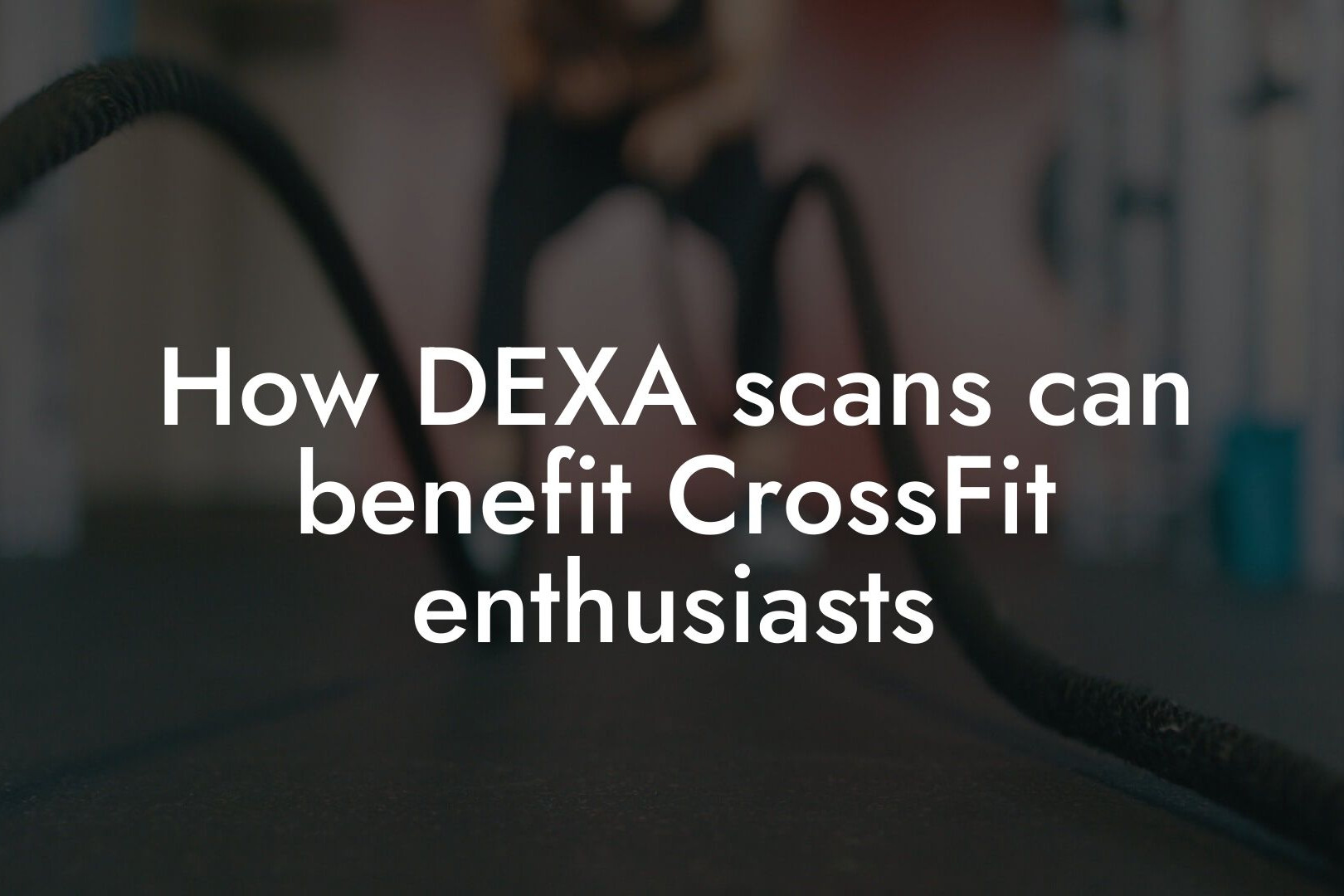As a CrossFit athlete, you know that nutrition plays a critical role in your performance and recovery. A well-planned diet can help you optimize your workouts, build lean muscle mass, and reduce your risk of injury. In this article, we'll explore the key nutrition strategies that every CrossFit athlete should know.
Table of Contents
Macronutrient Balance
Macronutrients are the three main categories of nutrients that provide energy and support growth and maintenance. The three macronutrients are carbohydrates, protein, and fat. A balanced diet for CrossFit athletes should include a combination of all three macronutrients in the following proportions:
Carbohydrates: 2-3 grams per kilogram of body weight
Protein: 1.6-2.2 grams per kilogram of body weight
Fat: 0.5-1 gram per kilogram of body weight
Carbohydrates provide energy for high-intensity workouts, protein supports muscle growth and repair, and fat provides energy and supports hormone production. Aim to consume complex carbohydrates such as whole grains, fruits, and vegetables, lean protein sources such as chicken, fish, and eggs, and healthy fats such as nuts, seeds, and avocados.
Meal Frequency and Timing
Meal frequency and timing are critical for CrossFit athletes. Aim to eat 4-6 meals per day, spaced out every 2-3 hours. This includes 3 main meals and 2-3 snacks in between. Eating frequent meals helps to maintain energy levels, support muscle growth and repair, and reduce muscle soreness.
Post-workout nutrition is also critical. Aim to consume a meal or snack that includes a combination of carbohydrates and protein within 30-60 minutes after your workout. This helps to replenish energy stores, support muscle recovery, and reduce muscle soreness.
Hydration
Hydration is essential for CrossFit athletes. Aim to drink at least 8-10 glasses of water per day, and make sure to drink water before, during, and after your workouts. Dehydration can lead to decreased performance, increased risk of injury, and impaired recovery.
Electrolytes and Supplements
Electrolytes such as sodium, potassium, and magnesium are essential for maintaining proper hydration and supporting athletic performance. Aim to consume electrolyte-rich foods such as bananas, avocados, and nuts, and consider adding electrolyte supplements to your diet.
Other supplements that may be beneficial for CrossFit athletes include protein powder, creatine, and branched-chain amino acids (BCAAs). However, always consult with a healthcare professional or registered dietitian before adding any new supplements to your diet.
Pre-Workout Nutrition
Pre-workout nutrition is critical for CrossFit athletes. Aim to consume a meal or snack that includes a combination of carbohydrates and protein 1-2 hours before your workout. This helps to provide energy, support muscle function, and reduce muscle soreness.
Some examples of pre-workout meals or snacks include:
Oatmeal with banana and almond butter
Greek yogurt with berries and honey
Whole grain toast with avocado and eggs
Post-Workout Nutrition
Post-workout nutrition is critical for CrossFit athletes. Aim to consume a meal or snack that includes a combination of carbohydrates and protein within 30-60 minutes after your workout. This helps to replenish energy stores, support muscle recovery, and reduce muscle soreness.
Some examples of post-workout meals or snacks include:
Protein smoothie with banana and almond milk
Whole grain crackers with peanut butter and banana slices
Grilled chicken breast with sweet potato and green beans
Body Composition and Performance
As a CrossFit athlete, you know that body composition and performance are closely linked. A well-planned diet can help you optimize your body composition, improve your performance, and reduce your risk of injury.
At Tano Performance Group, we use DEXA scanning to provide a complete body assessment, including body fat percentage, lean muscle mass, and bone density. This information can help you tailor your diet and training program to achieve your goals.
In conclusion, nutrition plays a critical role in the performance and recovery of CrossFit athletes. By following the nutrition strategies outlined in this article, you can optimize your diet, improve your performance, and reduce your risk of injury. Remember to focus on macronutrient balance, meal frequency and timing, hydration, electrolytes and supplements, pre-workout and post-workout nutrition, and body composition and performance. With the right nutrition plan, you can take your CrossFit training to the next level.
At Tano Performance Group, we're committed to helping high-earning professionals like you achieve their fitness goals. Contact us today to learn more about our DEXA scanning services and how we can help you take your physique to the next level.
Frequently Asked Questions
What is the importance of nutrition for CrossFit athletes?
Nutrition plays a crucial role in the performance and recovery of CrossFit athletes. A well-planned diet provides the necessary fuel for high-intensity workouts, aids in muscle recovery, and supports overall health. Proper nutrition can improve performance, reduce the risk of injury, and enhance overall well-being.
How many calories do I need to consume as a CrossFit athlete?
The caloric needs of CrossFit athletes vary depending on factors such as age, sex, weight, height, and activity level. Generally, athletes require 2500-4000 calories per day, with a macronutrient breakdown of 25-30% protein, 40-50% carbohydrates, and 25-30% fat. However, individual caloric needs may differ, and it's essential to consult with a registered dietitian or nutritionist to determine specific requirements.
What are the best sources of protein for CrossFit athletes?
High-quality protein sources are essential for muscle growth, repair, and recovery. The best sources of protein for CrossFit athletes include lean meats (chicken, turkey, beef), fish (salmon, tilapia), eggs, dairy (milk, Greek yogurt), legumes (lentils, chickpeas), and plant-based options (quinoa, tofu, tempeh). Aim to consume 1.2-1.6 grams of protein per kilogram of body weight daily.
How much carbohydrate do I need as a CrossFit athlete?
Carbohydrates are an essential source of energy for high-intensity workouts. Focus on complex carbohydrates such as whole grains (brown rice, quinoa, whole wheat), fruits, and vegetables. Aim to consume 2-3 grams of carbohydrates per kilogram of body weight daily, with a focus on complex carbohydrates during the pre-workout meal and simple carbohydrates during the post-workout meal.
What is the role of healthy fats in a CrossFit athlete's diet?
Healthy fats are essential for hormone production, brain function, and absorption of vitamins. Include sources of healthy fats such as nuts (almonds, walnuts), seeds (chia, flax), avocados, and olive oil in your diet. Aim to consume 0.5-1 gram of healthy fats per kilogram of body weight daily.
How often should I eat as a CrossFit athlete?
Aim to eat 4-6 meals per day, spaced out every 2-3 hours, to maintain stable energy levels and support muscle recovery. Include 2-3 main meals and 2-3 snacks in between, consisting of a balance of protein, carbohydrates, and healthy fats.
What are the best pre-workout foods for CrossFit athletes?
The ideal pre-workout meal should provide a balance of carbohydrates, protein, and healthy fats. Examples of pre-workout foods include oatmeal with banana and almond butter, Greek yogurt with berries and honey, or a protein smoothie with avocado and spinach. Aim to eat a meal 1-2 hours before the workout, and a snack 30-60 minutes before the workout.
What are the best post-workout foods for CrossFit athletes?
The ideal post-workout meal should provide a balance of carbohydrates and protein to aid in muscle recovery. Examples of post-workout foods include a protein shake with fruit, Greek yogurt with honey and nuts, or a meal with grilled chicken and sweet potatoes. Aim to eat a meal or snack within 30-60 minutes after the workout.
How much water should I drink as a CrossFit athlete?
Adequate hydration is crucial for performance and recovery. Aim to drink at least 8-10 glasses of water per day, with an additional 16-20 ounces of water 1-2 hours before the workout. Monitor urine color to ensure it's pale yellow or clear, indicating proper hydration.
What are the benefits of meal planning for CrossFit athletes?
Meal planning helps ensure that athletes meet their nutritional needs, saves time, and reduces stress. It also allows for better portion control, reduced food waste, and increased accountability. Consider working with a registered dietitian or nutritionist to develop a personalized meal plan.
How can I track my macronutrient intake as a CrossFit athlete?
Tracking macronutrient intake helps ensure that athletes meet their nutritional needs. Use a food diary or mobile app (e.g., MyFitnessPal) to track daily food intake, including portion sizes and macronutrient breakdown. Regularly review and adjust the diet to ensure optimal performance and recovery.
What are the consequences of poor nutrition for CrossFit athletes?
Poor nutrition can lead to decreased performance, increased risk of injury, and impaired recovery. It can also result in fatigue, mood disturbances, and decreased immune function. Conversely, optimal nutrition can enhance performance, reduce the risk of injury, and support overall health and well-being.
How can I balance my nutrition and training goals?
Balance nutrition and training goals by prioritizing recovery, listening to your body, and making adjustments as needed. Focus on progressive overload in training, and adjust nutrition to support muscle growth and recovery. Consult with a registered dietitian or nutritionist to develop a personalized plan.
What are the benefits of working with a registered dietitian or nutritionist?
Working with a registered dietitian or nutritionist provides personalized guidance, tailored to individual needs and goals. They can help develop a meal plan, track progress, and make adjustments to optimize performance and recovery. They can also provide education on nutrition principles, meal planning, and cooking techniques.
How can I stay motivated to stick to my nutrition plan?
Stay motivated by setting realistic goals, tracking progress, and celebrating small victories. Find a nutrition accountability partner, and consider working with a registered dietitian or nutritionist for support and guidance. Focus on the benefits of optimal nutrition, such as improved performance and recovery, rather than the restrictions.
What are the common nutrition mistakes made by CrossFit athletes?
Common nutrition mistakes include inadequate protein intake, poor carbohydrate timing, and insufficient hydration. Other mistakes include relying on supplements rather than whole foods, neglecting meal planning, and failing to adjust nutrition based on individual needs and goals.
How can I adjust my nutrition plan during periods of high-intensity training?
During periods of high-intensity training, increase caloric intake to support energy demands. Focus on carbohydrate loading, and adjust protein and healthy fat intake accordingly. Consider working with a registered dietitian or nutritionist to develop a personalized plan.
What are the benefits of periodized nutrition for CrossFit athletes?
Periodized nutrition involves adjusting nutrition plans based on training phases. This approach can enhance performance, reduce the risk of injury, and support overall health and well-being. It involves adjusting macronutrient ratios, meal frequency, and caloric intake based on individual needs and training goals.
How can I incorporate supplements into my nutrition plan?
Supplements can be useful for CrossFit athletes, but whole foods should always be the primary source of nutrition. Consult with a registered dietitian or nutritionist to determine the need for supplements, and choose high-quality products from reputable manufacturers. Always follow the recommended dosages and guidelines.
What are the benefits of working with a coach or trainer for nutrition guidance?
Working with a coach or trainer can provide personalized guidance, tailored to individual needs and goals. They can help develop a nutrition plan, provide accountability, and offer support and motivation. They can also provide education on nutrition principles, meal planning, and cooking techniques.
How can I stay on track with my nutrition plan during social events or travel?
Stay on track by planning ahead, packing snacks, and researching healthy options. Consider meal prepping, and choose restaurants that offer healthy options. Don't be too hard on yourself if you deviate from your plan, but instead focus on getting back on track as soon as possible.
What are the benefits of tracking progress photos and body measurements?
Tracking progress photos and body measurements provides a visual representation of progress, helping to stay motivated and focused. It also allows for adjustments to the nutrition and training plan, ensuring optimal results.
How can I incorporate nutrition education into my daily routine?
Incorporate nutrition education by reading books, articles, and online resources. Follow registered dietitians, nutritionists, and health professionals on social media, and attend workshops or seminars. Apply learned principles to daily life, and share knowledge with others to reinforce understanding.
Here are some related articles you might love...
- The role of body composition in CrossFit performance
- Balancing strength and flexibility in CrossFit
- How DEXA scans can benefit CrossFit enthusiasts
- The importance of muscle recovery in CrossFit
- How to maintain bone density with CrossFit training
- Improving endurance for CrossFit competitions
- Strength training tips specific to CrossFit workouts
- Preventing injuries in CrossFit: A comprehensive guide
- Reducing body fat for better CrossFit performance
Zak Faulkner
Zak Faulkner is a leading authority in the realm of physical health and body composition analysis, with over 15 years of experience helping professionals optimise their fitness and well-being. As one the experts behind Tano Performance Group, Zak has dedicated his career to providing in-depth, science-backed insights that empower clients to elevate their physical performance and overall health.
With extensive knowledge of DEXA technology, Zak specializes in delivering comprehensive body assessments that offer precise data on body fat, muscle mass, bone density, and overall physique. His expertise enables individuals to make informed decisions and achieve their fitness goals with accuracy and confidence. Zak’s approach is rooted in a deep understanding of human physiology, combined with a passion for helping clients unlock their full potential through personalised strategies.
Over the years, Zak has earned a reputation for his commitment to excellence, precision, and client-focused service. His guidance is trusted by top professionals who demand the best when it comes to their health. Whether advising on fitness programs, nutritional strategies, or long-term wellness plans, Zak Faulkner’s insights are a valuable resource for anyone serious about taking their health and fitness to the next level.
At Tano Performance Group, Zak continues to lead our Content Team revolutionising how professionals approach their physical health, offering unparalleled expertise that drives real results.




